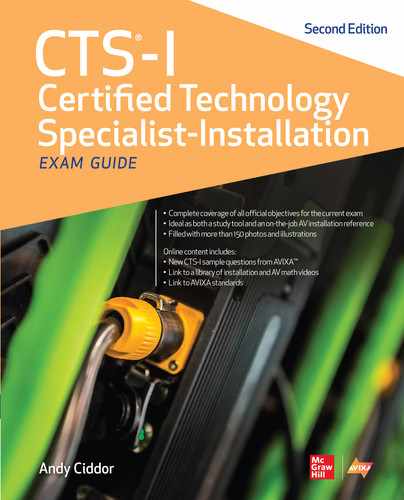CONTENTS
Part I The CTS-Installation and CTS-I Exam
Chapter 1 Getting CTS-I Certification
What Does a CTS-I Certified Installer Do?
Why Earn Your CTS-I Credential?
Are You Eligible for the CTS-I Exam?
Answers to Sample CTS-I Exam Questions
The CTS-I Exam Application and Processes
Items Restricted from the Exam Room
Dismissal or Removal from the Exam
Hazardous Weather or Local Emergencies
Special Accommodations for Exams
Part II The Basics of AV Installation
Chapter 3 Managing an AV Project
Managing Project Resources and Activities
Gantt Chart for Project Schedules
Logic Network Diagram for Coordinating Resources
Monitoring Work at the Client Site
Other Project Management Activities
Providing Project Documentation
Ongoing Project Responsibilities
Chapter 4 Audiovisual Documentation
Audiovisual Drawings and Diagrams
Calculating Dimensions from Scaled Drawings
Chapter 5 Pre-installation Activities
Types of Audiovisual Job Sites
Evaluating Facility Conditions
De-installing Existing Equipment
Working with Stakeholders and Other Trades
Procuring Equipment and Supplies
Types of Cable Used in AV Systems
Twisted-Pair Network Cables (Cat x)
Shielded Twisted-Pair Network Cables
Chapter 7 Mounting AV Equipment
Inspect the Building Structure
Load and Weight Considerations
Selecting Fasteners for Mounts
Power Distribution Within a Rack
Signal Separation Within a Rack
Chapter 9 Audio Systems Installation
Perceived Sound Pressure Level
Balanced and Unbalanced Circuits
Loudspeaker Installation Guidelines
Direct-Coupled and Constant-Voltage Loudspeaker Wiring
Series Circuit Impedance Formula
Parallel Circuit, Same Impedance Formula
Parallel Circuit, Differing Impedance Formula
Series/Parallel Combination Formula
Chapter 10 Video Systems Installation
Digital Video Bandwidth Requirements
Installing Video Source Components
Installing Video-Processing Components
Installing Video Display Components
Mounting an Electrically Operated Front-Projection Screen
Mounting a Manual Wall-Mounted Projection Screen
Mounting a Projector to the Ceiling
Part V System Setup, Verification, and Closeout
Chapter 11 Introduction to System Verification
Performance Verification Standard
Circuits: Impedance and Resistance
Verifying Power and Earthing/Grounding
Step 1: Symptom Recognition and Elaboration
Step 2: List and Localize the Faulty Function
Network Interface Controllers and MAC Addresses
Copper Twisted-Pair Network Cables
Static and Dynamic IP Addresses
Dynamic Host Configuration Protocol
Automatic Private IP Addressing
Network Verification and Troubleshooting
Chapter 13 Audiovisual Control Systems
Control System Signal-Flow Diagrams
Troubleshooting Control Systems
Talking Control with the Customer
Performance Verification Standard
Chapter 14 Audio Gain and System Equalization
Importance of Setting System Gain
Selecting a Method of Gain Structure
The Benefits of Using the Optimization Method
Setting Gain Using the System Optimization Method
Setting Gain Structure for Audio DSPs
Single-Channel vs. Dual-Channel Measurements
Room-Based Loudspeaker Measurements
Preparation for the RTA Method
Tools for Using Dual-Channel FFT
Adjusting for a Neutral Transfer Function
Finishing the Equalization Process
Performance Verification Standard
Audio Performance Verification Items
Chapter 15 Video System Setup and Verification
High-Bandwidth Digital Content Protection
HDCP Device Authentication and Key Exchange
HDCP Authentication with Repeaters
Verifying the Video Signal Path
Correcting Audio/Video Sync Errors
Chapter 16 Conducting System Closeout
Verification Standard for System Closeout
Part VI Ongoing Project Responsibilities
Chapter 17 Maintaining and Repairing Audiovisual Systems
Troubleshooting in Live Events
Devising a Preventive Maintenance Schedule
Part VII Appendixes and Glossary
Appendix A Math Formulas Used in AV Installations
Using the Proper Order of Operations
Steps to Solving Word Problems
Step 1: Understand the Problem
Published Standards, Recommended Practices, and Technical Reports
Appendix C AVIXA AV Standards Clearinghouse
Appendix E About the Online Content
Your Total Seminars Training Hub Account
